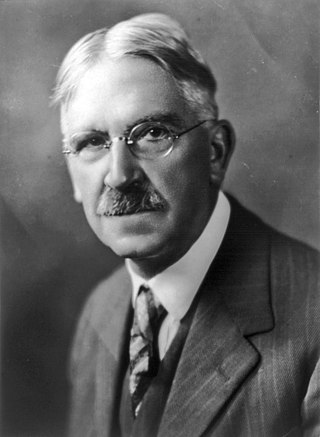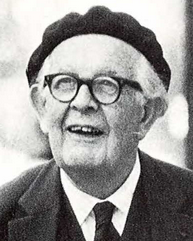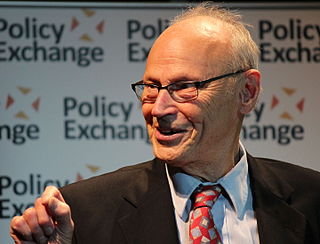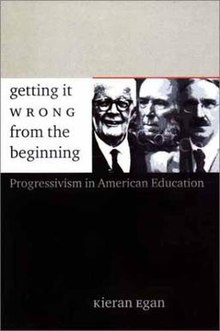Progressive education, or educational progressivism, is a pedagogical movement that began in the late 19th century and has persisted in various forms to the present. In Europe, progressive education took the form of the New Education Movement. The term progressive was engaged to distinguish this education from the traditional curricula of the 19th century, which was rooted in classical preparation for the early-industrial university and strongly differentiated by social class. By contrast, progressive education finds its roots in modern, post-industrial experience. Most progressive education programs have these qualities in common:

Educational psychology is the branch of psychology concerned with the scientific study of human learning. The study of learning processes, from both cognitive and behavioral perspectives, allows researchers to understand individual differences in intelligence, cognitive development, affect, motivation, self-regulation, and self-concept, as well as their role in learning. The field of educational psychology relies heavily on quantitative methods, including testing and measurement, to enhance educational activities related to instructional design, classroom management, and assessment, which serve to facilitate learning processes in various educational settings across the lifespan.

John Dewey was an American philosopher, psychologist, and educational reformer. He was one of the most prominent American scholars in the first half of the twentieth century.
The theory of recapitulation, also called the biogenetic law or embryological parallelism—often expressed using Ernst Haeckel's phrase "ontogeny recapitulates phylogeny"—is a historical hypothesis that the development of the embryo of an animal, from fertilization to gestation or hatching (ontogeny), goes through stages resembling or representing successive adult stages in the evolution of the animal's remote ancestors (phylogeny). It was formulated in the 1820s by Étienne Serres based on the work of Johann Friedrich Meckel, after whom it is also known as Meckel–Serres law.

The philosophy of education is the branch of applied philosophy that investigates the nature of education as well as its aims and problems. It includes the examination of educational theories, the presuppositions present in them, and the arguments for and against them. It is an interdisciplinary field that draws inspiration from various disciplines both within and outside philosophy, like ethics, political philosophy, psychology, and sociology. These connections are also reflected in the significant and wide-ranging influence the philosophy of education has had on other disciplines. Many of its theories focus specifically on education in schools but it also encompasses other forms of education. Its theories are often divided into descriptive and normative theories. Descriptive theories provide a value-neutral account of what education is and how to understand its fundamental concepts, in contrast to normative theories, which investigate how education should be practiced or what is the right form of education.

Jean William Fritz Piaget was a Swiss psychologist known for his work on child development. Piaget's theory of cognitive development and epistemological view are together called "genetic epistemology".
Lawrence Kohlberg was an American psychologist best known for his theory of stages of moral development.

George Louis Palmella Busson du Maurier was a Franco-British cartoonist and writer known for work in Punch and a Gothic novel Trilby, featuring the character Svengali. His son was the actor Sir Gerald du Maurier. The writers Angela du Maurier and Dame Daphne du Maurier and the artist Jeanne du Maurier were all granddaughters of George. He was also father of Sylvia Llewelyn Davies and grandfather of the five boys who inspired J. M. Barrie's Peter Pan.

Herbert Spencer was an English polymath active as a philosopher, psychologist, biologist, sociologist, and anthropologist. Spencer originated the expression "survival of the fittest", which he coined in Principles of Biology (1864) after reading Charles Darwin's 1859 book On the Origin of Species. The term strongly suggests natural selection, yet Spencer saw evolution as extending into realms of sociology and ethics, so he also supported Lamarckism.

Constructivism is a theory in education which posits that individuals or learners do not acquire knowledge and understanding by passively perceiving it within a direct process of knowledge transmission, rather they construct new understandings and knowledge through experience and social discourse, integrating new information with what they already know. For children, this includes knowledge gained prior to entering school. It is associated with various philosophical positions, particularly in epistemology as well as ontology, politics, and ethics. The origin of the theory is also linked to Swiss developmental psychologist Jean Piaget's theory of cognitive development.

Piaget's theory of cognitive development is a comprehensive theory about the nature and development of human intelligence. It was originated by the Swiss developmental psychologist Jean Piaget (1896–1980). The theory deals with the nature of knowledge itself and how humans gradually come to acquire, construct, and use it. Piaget's theory is mainly known as a developmental stage theory.
Cognitive development is a field of study in neuroscience and psychology focusing on a child's development in terms of information processing, conceptual resources, perceptual skill, language learning, and other aspects of the developed adult brain and cognitive psychology. Qualitative differences between how a child processes their waking experience and how an adult processes their waking experience are acknowledged. Cognitive development is defined as the emergence of the ability to consciously cognize, understand, and articulate their understanding in adult terms. Cognitive development is how a person perceives, thinks, and gains understanding of their world through the relations of genetic and learning factors. There are four stages to cognitive information development. They are, reasoning, intelligence, language, and memory. These stages start when the baby is about 18 months old, they play with toys, listen to their parents speak, they watch tv, anything that catches their attention helps build their cognitive development.

Eric "E. D." Donald Hirsch Jr. is an American educator, literary critic, and theorist of education. He is professor emeritus of education and humanities at the University of Virginia.

Kieran Egan was an Irish educational philosopher and a student of the classics, anthropology, cognitive psychology, and cultural history. He has written on issues in education and child development, with an emphasis on the uses of imagination and the stages that occur during a person's intellectual development. He has questioned the work of Jean Piaget and progressive educators, notably Herbert Spencer and John Dewey.

The Educated Mind: How Cognitive Tools Shape Our Understanding is a 1997 book on educational theory by Kieran Egan.
In psychology, constructivism refers to many schools of thought that, though extraordinarily different in their techniques, are all connected by a common critique of previous standard approaches, and by shared assumptions about the active constructive nature of human knowledge. In particular, the critique is aimed at the "associationist" postulate of empiricism, "by which the mind is conceived as a passive system that gathers its contents from its environment and, through the act of knowing, produces a copy of the order of reality".

Democracy and Education: An Introduction to the Philosophy of Education is a 1916 book by John Dewey.
Eleanor Ruth Duckworth is a teacher, teacher educator, and psychologist.
The New Education movement, also known as the New School, éducation nouvelle in French, and Reformpädagogik in German, was an early 20th-century progressive movement within education and the European counterpart to the progressive education movement.












